★★★
“Charlie’s Korean, Medieval Angels”
During the Joseon era in Korea, a trio of bounty hunters, Jin-Ok (Ha Ji-Won), Hong-Dan (Gang Ye-Won) and Ga-Bi (Son Ga-In), work with their agent, Moo-Myung (Ko Chang-Seok), capturing wanted bandits. But they get a different task, after a King’s envoy carrying an encoded message is the latest courier to go missing, and are charged with bringing him in. Needless to say, it’s not a simple task, and they find themselves facing a host of players opposed to the King receiving the message, which would threaten the fragile relationship with the Chinese emperor. But there’s also a personal angle, as Jin-Ok finds herself face-to-face with the man she remembers as having killed her father.
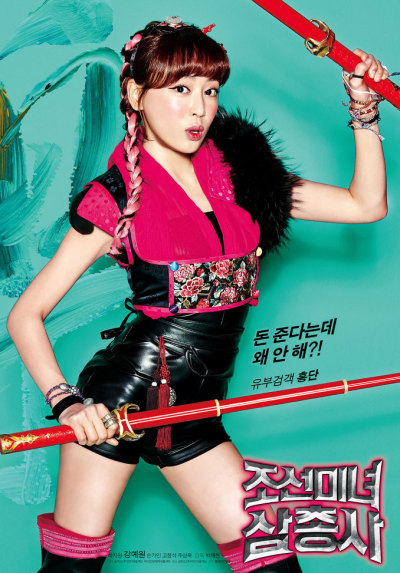 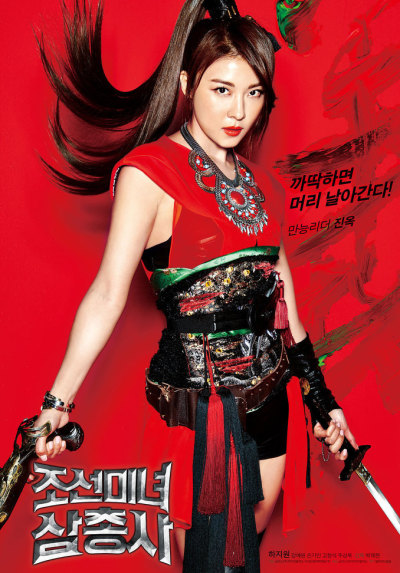 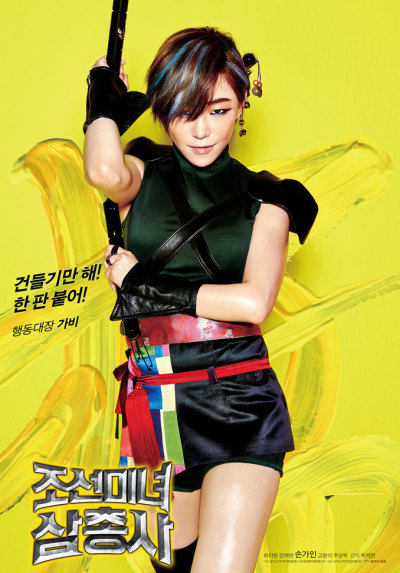 |
Early on, it becomes abundantly clear that this is not intended to be taken entirely seriously, probably from the time one of the heroines whips out her yo-yo, and takes out an entire platoon of enemies, Sukeban Deka style. Indeed, it’s probably the comedic elements that work best, such as the constable who follows him around, convinced his camo skills will stop him being seen – in a rarity for the humour often seen in Eastern films, it’s a joke which could have been used more, rather than being driven into the ground as normal. However, it feels that this lack of seriousness was taken by the makers as a reason to slap together the story, which lurches from set-piece to set-piece without any sense of logic or narrative flow – and don’t even get me started on the whole “dramatic amnesia” suffered by Jin-Ok.
It’s also fairly obvious the actresses aren’t doing very much of their own action, putting them behind Drew Barrymore et al, and in another galaxy, far, far away, from the participants in another cinematic cousin, The Heroic Trio. Ha probably comes off the best of the three, but there’s an awful lot of scenes which consist largely of close-ups of the actresses flailing wildly, intercut with wide shots from behind of someone competent. However, it still passes the time easily, particularly after all the parties involved end up in the port city of Byeokrando – or, at least, a convincing CGI imitation thereof. This allows plenty of scope for some impressive bits of combat, regardless of who’s actually doing them, as well as exploding pagodas, and other chunks of mass destruction. It also helps that the performances are solid from just about everyone concerned, which shores up the flimsy constructs of the storyline. I’m informed that the Korean title translates as “Three Beautiful Musketeers of Joseon,” and that’s probably an accurate an overall summary as the preceding 400 words.
Dir: Park Je-Hyun
Star: Ha Ji-Won, Gang Ye-Won, Son Ga-In, Ko Chang-Seok





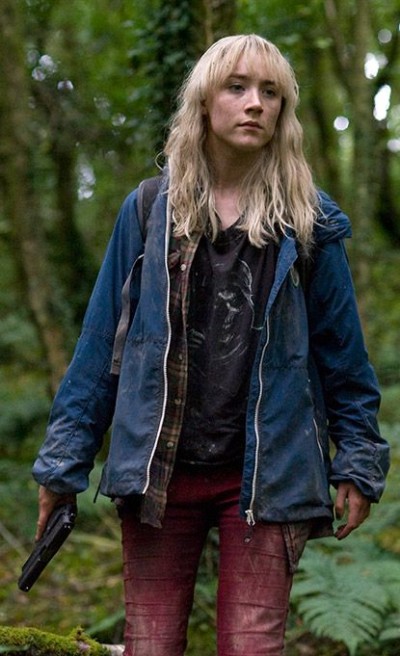
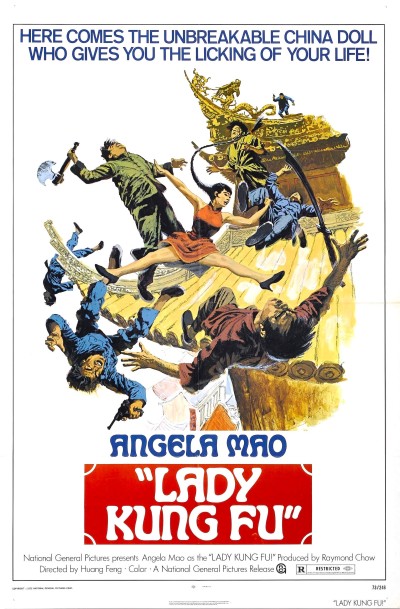
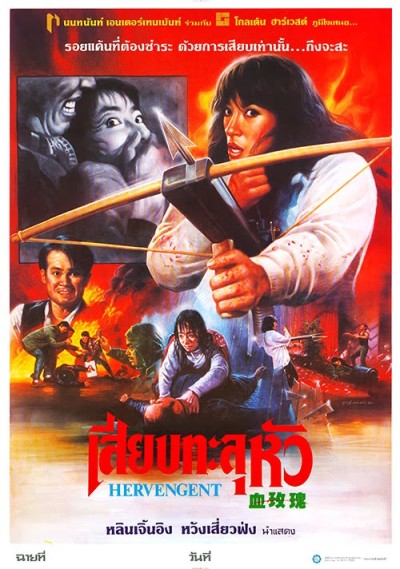 Director Lam is responsible for insane cult classic, The Story of Ricky, and if this is more restrained, it’s only by comparison. Casino manager Chieh Ying (Wong) is gang-raped by five sleazebags – and, wouldn’t you know it, they’re the same guys who killed her father. Worse is to come, as a trip to the doctor reveals a rather nasty case of venereal disease, and after some melancholic wandering around which occupies the rest of the first half (and, to be frank, is rather boring), our heroine gets tore into the villains, extracting the titular payback. Though you know the old saying, “She who seeks vengeance, must first dig two graves”? That’s a severe understatement here, because this roaring rampage will end needing an entire cemetery, costing Chieh Ying almost everybody she cares about, from her uncle, a wheelchair bound kung-fu wizard (Lam, best known for the Mr. Vampire series), to her wannabe boyfriend (Wong).
Director Lam is responsible for insane cult classic, The Story of Ricky, and if this is more restrained, it’s only by comparison. Casino manager Chieh Ying (Wong) is gang-raped by five sleazebags – and, wouldn’t you know it, they’re the same guys who killed her father. Worse is to come, as a trip to the doctor reveals a rather nasty case of venereal disease, and after some melancholic wandering around which occupies the rest of the first half (and, to be frank, is rather boring), our heroine gets tore into the villains, extracting the titular payback. Though you know the old saying, “She who seeks vengeance, must first dig two graves”? That’s a severe understatement here, because this roaring rampage will end needing an entire cemetery, costing Chieh Ying almost everybody she cares about, from her uncle, a wheelchair bound kung-fu wizard (Lam, best known for the Mr. Vampire series), to her wannabe boyfriend (Wong).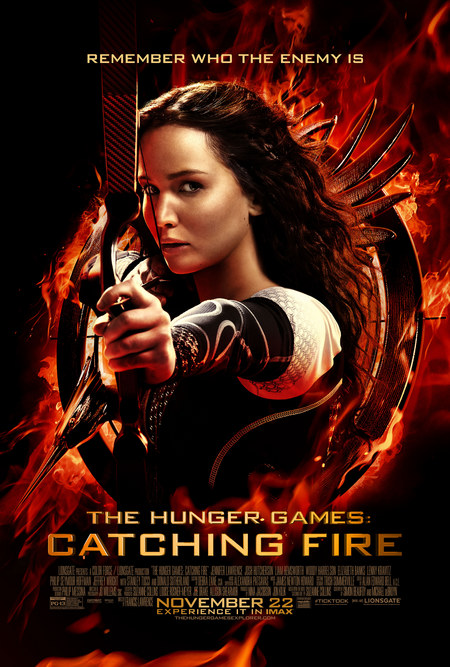
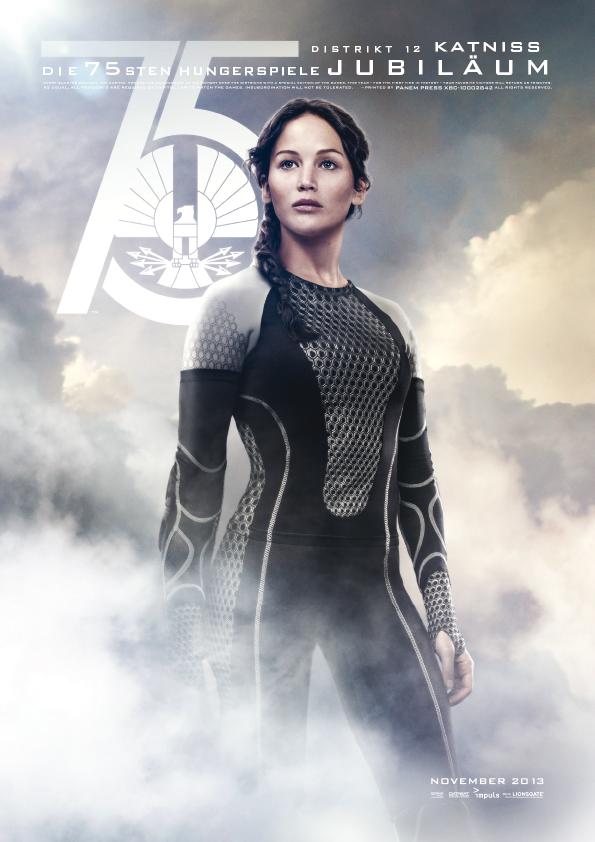












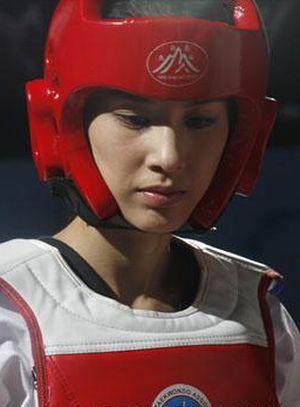
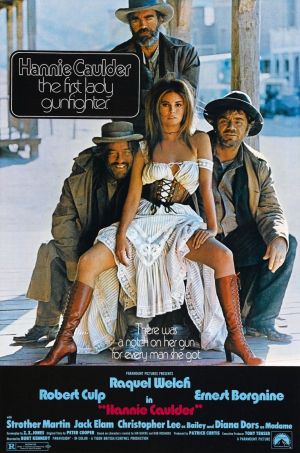 If genre entries produced in Italy are “spaghetti Westerns”, what does that make those produced in Britain? “Fish and chip Westerns?” “Roast beef Westerns?” Shot in Spain, but made by Tigon Film, and including such quintessential Brits as Christopher Lee and Diana Dors in supporting roles, this is nicely-photographed and hits all the right notes. But as the titular character, who seeks revenge after her husband is gunned down, and she herself raped, by the Clemens brothers, Welch perhaps has too much cinematic baggage. While responsible for one of the all-time absolute
If genre entries produced in Italy are “spaghetti Westerns”, what does that make those produced in Britain? “Fish and chip Westerns?” “Roast beef Westerns?” Shot in Spain, but made by Tigon Film, and including such quintessential Brits as Christopher Lee and Diana Dors in supporting roles, this is nicely-photographed and hits all the right notes. But as the titular character, who seeks revenge after her husband is gunned down, and she herself raped, by the Clemens brothers, Welch perhaps has too much cinematic baggage. While responsible for one of the all-time absolute  Rika (Kudo) and her schoolgirl pal ditch education for a day and head off to a remote village to check up on her grandfather, who hasn’t been heard from for a while. But as soon as they arrive, the pair come under attack by zombies, initially spawned as the result of a euthanasia drug being tried out by the Japanese government to address the whole “inverse pyramid” thing. They do reach Grandpa’s house, but find him in the stages of advanced Alzheimer’s – at least, until Rika is bitten. Gramps removes the limb, and replaces it with one conveniently lying around, which happens to belong to a master zombie hunter. Who cares if it’s the wrong colour and incredibly muscular? With America preparing a Return of the Living Dead style cleansing operation on the area, Rika and her allies have to locate the King Zombie and kill him, before being reduced to their constituent atoms.
Rika (Kudo) and her schoolgirl pal ditch education for a day and head off to a remote village to check up on her grandfather, who hasn’t been heard from for a while. But as soon as they arrive, the pair come under attack by zombies, initially spawned as the result of a euthanasia drug being tried out by the Japanese government to address the whole “inverse pyramid” thing. They do reach Grandpa’s house, but find him in the stages of advanced Alzheimer’s – at least, until Rika is bitten. Gramps removes the limb, and replaces it with one conveniently lying around, which happens to belong to a master zombie hunter. Who cares if it’s the wrong colour and incredibly muscular? With America preparing a Return of the Living Dead style cleansing operation on the area, Rika and her allies have to locate the King Zombie and kill him, before being reduced to their constituent atoms.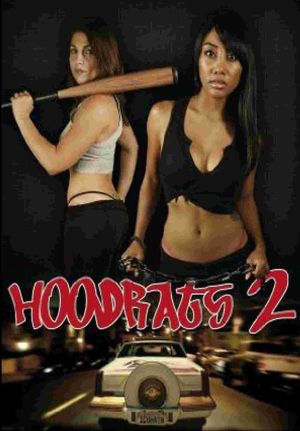 When Chino (Rodil) beats up his woman, Lucia (Sparagna) decides it has happened for the last time, and accompanied by her two friends, Celia (Mortel) and Miriam (Cho), she gives him a dose of his own medicine, with a baseball bat. This turns out to be a clear case of thinking without acting, because it turns out he’s a big kahuna in one of the local gangs, and is now out for revenge on the trio. After a drive-by cripples their vehicle (a ghettomobile with the amusing personalized plate, ‘ICUHATN’), they are stuck deep in enemy territory, with a lot of unfriendly people looking for them. And even if they make it out alive, what then?
When Chino (Rodil) beats up his woman, Lucia (Sparagna) decides it has happened for the last time, and accompanied by her two friends, Celia (Mortel) and Miriam (Cho), she gives him a dose of his own medicine, with a baseball bat. This turns out to be a clear case of thinking without acting, because it turns out he’s a big kahuna in one of the local gangs, and is now out for revenge on the trio. After a drive-by cripples their vehicle (a ghettomobile with the amusing personalized plate, ‘ICUHATN’), they are stuck deep in enemy territory, with a lot of unfriendly people looking for them. And even if they make it out alive, what then?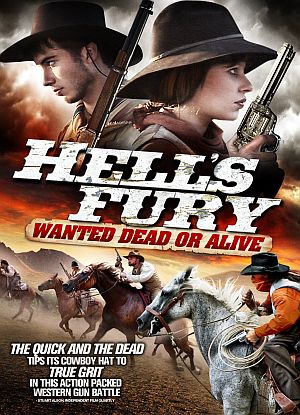 Eryn Cates (Hague) returns home to Texas from finishing school in New York, to find her family farm teetering on the edge of foreclosure [maybe if they hadn’t spent all that money to send her to finishing school in New York…]. In a misguided attempt to help things, her brother tries to rob a stagecoach carrying payroll, but is injured. The attempt fails, but local mogul Mortimer (Harris), who holds the loan on the Cates farm, sees a chance and pockets the loot. Two Texas Rangers, including the young and handsome Flint (Hagenbuch) show up to investigate the robbery, but it’s up to Eryn to save the family property, take on the mantle of the bandit, fend off the unwanted advances of Mortimer and engage in pseudo-romantic banter of the least interesting or convincing sort with Flint.
Eryn Cates (Hague) returns home to Texas from finishing school in New York, to find her family farm teetering on the edge of foreclosure [maybe if they hadn’t spent all that money to send her to finishing school in New York…]. In a misguided attempt to help things, her brother tries to rob a stagecoach carrying payroll, but is injured. The attempt fails, but local mogul Mortimer (Harris), who holds the loan on the Cates farm, sees a chance and pockets the loot. Two Texas Rangers, including the young and handsome Flint (Hagenbuch) show up to investigate the robbery, but it’s up to Eryn to save the family property, take on the mantle of the bandit, fend off the unwanted advances of Mortimer and engage in pseudo-romantic banter of the least interesting or convincing sort with Flint.